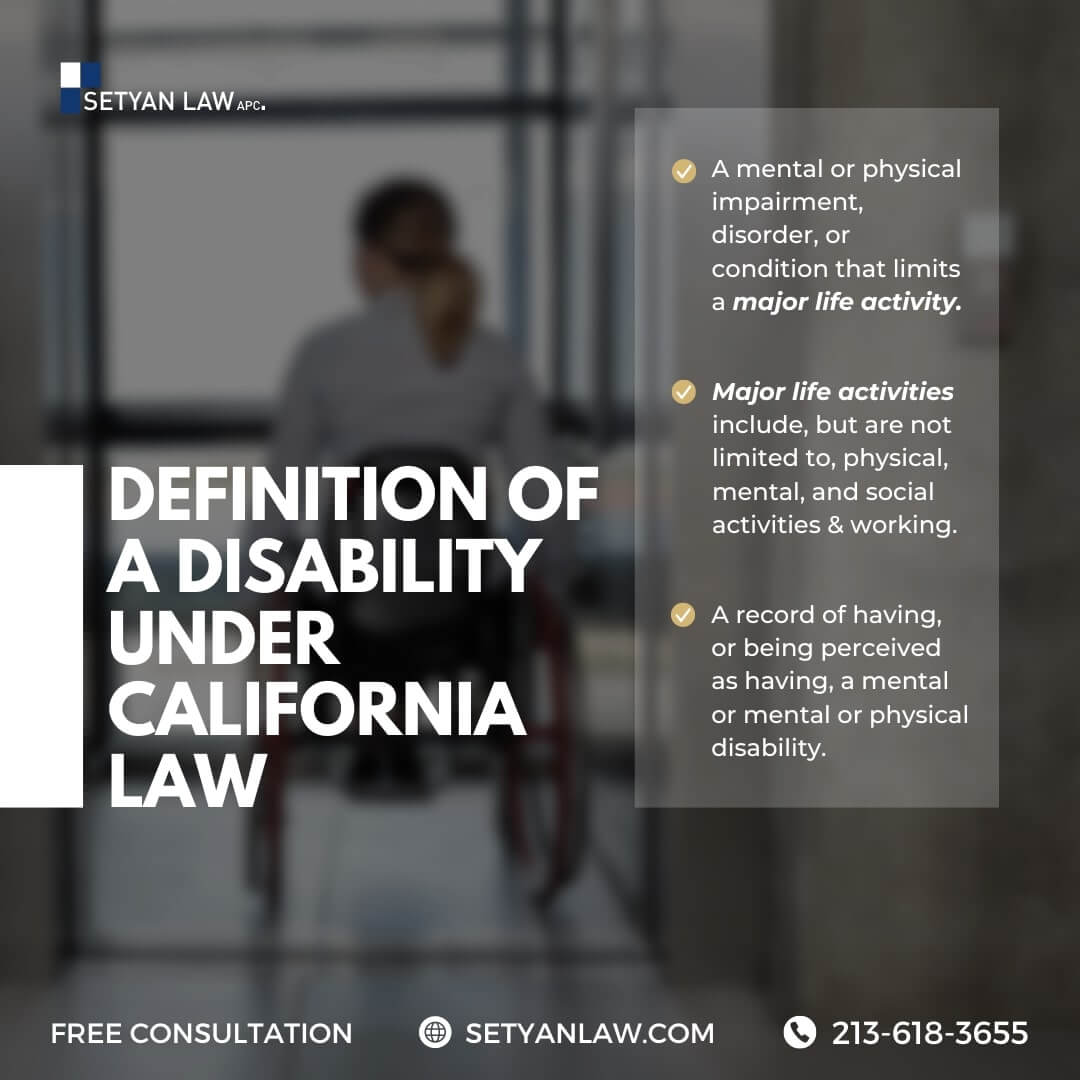Updated March 26, 2024
California Disability Discrimination Laws
In California, as well as under federal disability discrimination laws, it is illegal for employers to discriminate against individuals based on their physical or mental disabilities. Both the California Fair Employment and Housing Act (FEHA) and the Americans with Disabilities Act (ADA) protect qualified individuals from unfavorable treatment in the workplace due to their disabilities. Understanding the definitions and protections provided by these laws is crucial for employees and job applicants in California. This article aims to provide a comprehensive overview of the definition of a “disability” under federal and California law, the reasonable accommodations available to disabled employees, and the steps individuals can take to address disability discrimination in the workplace.
The Definition of a “Disability” under California Law
California law broadly construes the definition of a “disability” to ensure extensive protections for individuals:
According to the Fair Employment and Housing Act (FEHA), a disability is defined as an actual or perceived physical or mental disability, special education disability, or medical condition that limits one or more major life activities of the individual. This definition encompasses a wide range of impairments that affect an individual’s ability to perform essential functions in their daily lives.
Under the FEHA, a disability can include chronic diseases such as bipolar disorder, clinical depression, schizophrenia, obsessive-compulsive disorder, anxiety disorder, dementia, intellectual disabilities, specific learning disabilities, and more. Additionally, physical disabilities can encompass impairments like impaired eyesight, impaired hearing, impaired speech, chronic diseases, loss of a limb, cancer, pregnancy, and childbirth. The FEHA also incorporates the broader protections provided by the Americans with Disabilities Act of 1990 (ADA), which defines an individual with a disability as someone with a physical or mental impairment that substantially limits one or more major life activities, has a record of such an impairment, or is regarded as having such an impairment.
It is important to note that under California law, the term “limits” is used instead of “substantially limits” as required by the ADA. This means that the disability must make a major life activity “difficult” for the individual rather than “substantially limit” it. Major life activities encompass not only physical activities but also mental, social, and working activities.
Reasonable Accommodations for Disabled Employees in California
Employers in California are legally obligated to provide reasonable accommodations to employees with disabilities, unless doing so would result in undue hardship for the company. Reasonable accommodations are measures or adjustments that enable individuals with disabilities to perform essential job functions and enjoy equal employment opportunities.
These accommodations may include:
Restructuring the position: Employers may need to make changes to existing equipment and facilities to assist disabled workers in performing their job duties effectively. This could involve modifying workstations, providing assistive devices, or implementing accessibility features.
Job reassignment: If an employee is unable to perform their current position due to their disability, employers may consider transferring them to a similar job or a different location where they can fulfill the essential functions of the role.
Flexible scheduling: Modifying an employee’s hours and days of work may be necessary to accommodate medical treatments or other disability-related needs.
Medical leave: Employers are required to provide a reasonable amount of unpaid medical leave for employees with disabilities. This allows them to seek necessary medical treatment without fear of losing their job.
It is essential for employers to engage in a timely and good-faith interactive process with disabled employees to determine appropriate accommodations. This process involves open communication and collaboration between employers and employees to find effective solutions that meet the needs of both parties. Employers should evaluate each accommodation request on a case-by-case basis to assess whether it would impose undue hardship on the company. Undue hardship refers to significant difficulty or expense that would disrupt the operation of the business.
Addressing Disability Discrimination in the Workplace
If an employee or job applicant believes they have been subjected to disability discrimination in the workplace, they have the right to take legal action against their employer. Filing a lawsuit can help individuals seek compensation for the harm they have suffered and hold employers accountable for their discriminatory actions.
Here are the steps individuals can take to address disability discrimination in California:
Internal resolution: In many cases, it is advisable to first attempt to resolve the issue internally by discussing the concerns with a supervisor, human resources representative, or reasonable accommodation coordinator. Employers may be unaware of the discrimination and may be willing to rectify the situation.
Administrative complaint: If internal resolution efforts fail or are not feasible, individuals can file a complaint with the appropriate government agency. In California, disability discrimination complaints can be filed with the California Civil Rights Department (CRD), formerly known as the Department of Fair Employment and Housing (DFEH). The CRD enforces state laws against disability discrimination and provides a process for handling complaints.
Exhausting administrative remedies: Before filing a lawsuit against an employer, individuals are typically required to exhaust all administrative remedies. This means going through the complaint process with the CRD and obtaining a right-to-sue notice. However, there may be exceptions to this requirement, such as obtaining an immediate right-to-sue notice from the CRD, allowing individuals to proceed directly to court.
Working with an attorney: It is highly recommended to seek legal representation from an experienced employment law attorney who specializes in disability discrimination cases. An attorney can provide guidance, evaluate the merits of the case, and advocate on behalf of the individual throughout the legal process.
Filing a lawsuit: If efforts to resolve the matter through administrative channels are unsuccessful, individuals can file a lawsuit against their employer for disability discrimination. The lawsuit will be heard in either state or federal court, depending on the specific circumstances of the case.
It is important for individuals to be aware of the statute of limitations for filing a complaint or lawsuit. Generally, complaints must be filed within one year of the last incident of discrimination, harassment, or retaliation. However, exceptions may apply if the individual learned about the unlawful practice after the statute of limitations expired.
Conclusion
Understanding the definition of a “disability” under federal and California law is essential for individuals navigating the complexities of disability discrimination in the workplace. Both the California Fair Employment and Housing Act (FEHA) and the Americans with Disabilities Act (ADA) provide extensive protections for disabled employees, including the right to reasonable accommodations. By being aware of their rights and taking proactive steps to address disability discrimination, individuals can fight for justice and create more inclusive and equitable workplaces. If you believe you have experienced disability discrimination, it is crucial to consult with an experienced disability law attorney who can guide you through the legal process and advocate on your behalf.
If you need employment litigation, please call Setyan Law at (213)-618-3655. Free consultation.






